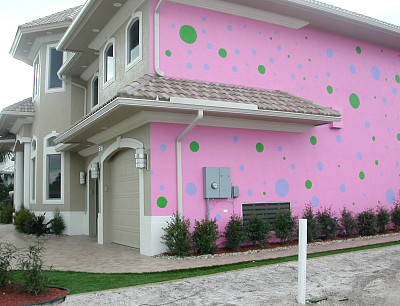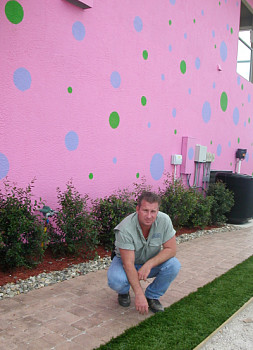|
Article
Courtesy of The Orlando Sentinel
By Wes Smith
Published on Sun, January 9, 2005
MARCO
ISLAND -- When city officials in this resort community told Ed Ehlen that he
would have to remove $19,000 in synthetic grass around his new $4 million home,
the boldness of his response surprised even those closest to him.
"They said it wasn't 'aesthetically pleasing.' I thought; 'I'll show you
what isn't aesthetically pleasing,' " said Ehlen, 39.
Not only did he refuse to tear
up the ersatz grass, but Ehlen retaliated to a neighbor's
complaints by painting that side of his stylish mansion a
Pepto-Bismol pink. With green and blue polka dots.
"Nobody was listening to me before, but they are listening to
me now," he said.
Ehlen's turf war and his pink protest wall quickly drew attention
far beyond Marco Island. In the past week, his yard yarn has
appeared on network television, in newspapers nationwide and on
National Public Radio.
"It's unbelievable," said Ehlen's brother Tom of the
media attention. "You've got a war |
|
In
a colorful protest, Ed Ehlen painted a side of his new $4 million home
after Marco Island officials told him to remove $19,000 in synthetic
grass. City officials say their primary concern is not the appearance of
the fake grass, but its environmental impact. |
going
on. You've got a tsunami. And you've got Ed's lawn!"
Ed
Ehlen has pledged to remove the pink and the polka dots before moving into the
house -- to appease his wife, if not the neighbors. But he vowed to unleash his
"pit-bull lawyer" on the city if anyone tries to tear up his manmade
blades.
"He's the youngest of four boys, so he has never been a pushover,"
said Tom, 46.
His brother is president of a
thriving Marco Island floor-covering company with $6 million in
annual sales. He started the business with his siblings 15 years
ago after "humping carpet out of Jeeps" as a
subcontractor for years.
"I never thought I'd have a house like this. I never thought
I'd have 50 guys working for me. And I never thought I'd have a
problem with the city," Ehlen said. "I'm not a
rabble-rouser. I don't have time for it."
Marco Island officials say their primary concern is not the
appearance of Ehlen's plastic grass -- which from a distance
appears more lush and greener than many area lawns -- but its
environmental impact.
With Ehlen's consent, city workers performed tests on his
polyethylene plot last month. They found that the tiny pellets of
recycled tire rubber that serve as fill beneath it are easily
washed into the city's storm sewers and nearby canals.
The pellets could harm fish, wildlife and
boat motors, too, claimed community-development director Greg
Niles, who has refused to issue a certificate of occupancy for
Ehlen's home until the un-grass is gone. "I'm
not just looking at one lawn; I'm looking at the whole island.
This may be an easy answer for |
|
Ed
Ehlen shows his Marco Island
home,
with its synthetic grass,
recently.
The city may consider
blocking
such lawns. Some places
already
ban the fake lawns, but
others
in dry areas encourage
their
use. |
one
homeowner, but is it a problem for homeowners overall?" Niles said.
The
use of synthetic turf in residential yards already has seeded controversy
elsewhere in Florida and across the country. So far, there has been little
consensus about its spread. Some cities and neighborhoods have banned the pseudo
sod while others in arid regions have offered incentives to those who use it.
The conflict will likely grow in coming years as homeowners and cities grapple
with declining water supplies and the environmental threat posed by lawn
chemicals.
There are now about 30 companies selling a variety of synthetic turfs, which
even natural-grass aficionados concede are often more attractive and
"playable" than ever before, said Grady Miller, a "turfgrass"
scientist at the University of Florida in Gainesville.
Miller conceded that there are compelling points on both sides. Even if they
last 30 years, the plastic yards will have to be rolled up and hauled off to
landfills.
"And weeds will get in that rubber backing and grow, so the claims of no
pesticides may be short-lived," he said.
Still, the turf expert said that if he lived in arid Arizona, "I might be
inclined to put some down for my kids to play on."
Miller urged Florida homeowners to be patient, however, because a lot of
research is directed at developing breeds of real grass that require little or
no watering, fertilizers, pesticides or even mowing.
"That is a major goal," he said. "But biological systems are more
difficult to control and engineer than producing something in a factory."
Henry Julicher, chief executive officer of Pennsylvania-based Sprinturf, which
manufactured Ehlen's "LawnScape" grass, describes it as "the
safest turf on Earth." Both the synthetic grass and the rubber infill are
nontoxic, he said.
The rubber pellets "pass right through the body" if ingested, Julicher
said.
He welcomed comparisons of his product and Florida's natural brand of blade.
"Grass down there is like crab grass," he said. "It's terrible
stuff to be on."
From a distance, Ehlen's synthetic lawn looks like a groomed golf fairway. Under
closer inspection in bright sun, it has an unnatural plastic sheen.
"Does it look a little fake? Yeah, but would you rather look at this or
that brown grass over there?" he asked.
Still, the artificial grass does nothing to reduce erosion, produce oxygen or
help cool the atmosphere like nature's own, said Niles, who is drafting an
amendment to the city's landscape code to specifically prohibit manufactured
lawns.
The planning board will consider that amendment at a Jan. 21 public hearing
before making a recommendation to the City Council, Niles said. If both the
board and council OK the amendment, Ehlen will have to tear up his faux lawn,
and at least two other synthetic yards on the island may be uprooted.
One of Ehlen's neighbors will be especially relieved when the matter is settled.
Ray and Carita Paret, who live just a block down the street, wrote in a letter
to a local newspaper that their dog Looie has turned up his nose at Ehlen's
artificial turf -- which might be a good thing.
"On our daily walks past this home, he will neither sniff, trod, pee or
poop on this lawn. That's his opinion," they wrote.
|

